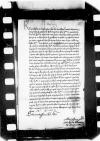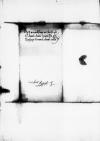Letter #2859
Tomasz SOBOCKI to Ioannes DANTISCUSCracow (Kraków), 1545-08-21
| received Heilsberg (Lidzbark Warmiński), 1545-08-31 Manuscript sources:
Auxiliary sources:
| ||||||||||
Text & apparatus & commentary Plain text Text & commentary Text & apparatus
Reverendissimo in Christo Patri et Domino, domino
Reverendissime in Christo Pater et Domine, domine colendissime.
Praemissa observantiae meae promptoque gratificandi studio in gratiam Vestrae Reverendissimae Dominationis commendatione.
Ex litteris Reverendissimae Dominationis Vestrae litteras meas gratas eidem fuisse intellexi, quod mihi sane pro eo, ac debuit, fuit et est gratissimum. In quibus a me postulat, ut tam non pro noviter cognito vel electo, sed veterrimo habeam amico. In qua re id sibi, rogo, Vestra Reverendissima Dominatio persuadeat me non infima felicitatis parte reputare summique esse apud me momenti Vestrae Reverendissimae Dominationis familiarem notitiam atque gratiam esse assecutum. De cuius quidem animo ne antea quidem, ut id, quod res est, fatear, umquam dubitam, omnia de Vestra Reverendissima Dominatione mihi pollicens, quaecumque de amicissimo et summe mihi affecto persuaderi poterant. Quam iam non in novis aut veteribus, sed summis ac, si tempore etiam aliquid metiri volumus, primis et vetustissimis amicis iampridem connumeravi. Meum vero erga se studium ac opinionem de me conceptam tum confirmabo, cum vel erga eiusdem Reverendissimam Dominationem, vel eos, quibus eandem optime velle intellexero, testatam facere per occasionem aliquam potero.
De
Quod mihi Vestra Reverendissima Dominatio manu propria scribit, se numquam quidquam eiusmodi scripsisse, quod non in summa frequentia et adversariorum etiam praesentia proloqueretur, id ego revera scio atque mihi de Vestrae Reverendissimae Dominationis prudentia persuadeo ab eadem nihil eiusmodi umquam prodiisse, per quod aut gratiae apud
Commendo me in gratiam Reverendissimae Dominationis Vestrae, quam diu salvam et incolumem esse ex animo cupio.
Datae
Reverendissimae Paternitatis Vestrae addictissimus servitor

